Best meal replacement shakes 2024
We've tested the best meal replacement shakes to see how they weigh up for taste, quality and ingredients.

1. Best overall
2. Best value
4. High in vitamins and minerals
7. Best protein and fiber content
9. Our experts
10. FAQs
11. How we test
The best meal replacement shakes offer an easy and convenient way to get all the nutrients your body needs to keep full and energized. They are perfect on-the-go, and can be a real life saver for people with strict dietary requirements and those without access to a kitchen. While it's always best to get all your essential nutrients from whole foods, the best meal replacement shakes can help you close the nutrition gaps for when you don't have enough time or resources to eat a balanced diet.
However, with such a mind-boggling amount of meal replacement shakes available on the market, picking the right product may feel like a challenge. So to help you make the best choice possible, we've tried and tested some of the best meal replacement shakes out there. We've excluded any products that had excessive levels of artificial sweeteners, additives or preservatives and opted for meal replacement shakes rich in natural ingredients. We've covered all bases when considering the texture of the powder, testing how well it mixed into water, milk, and foods such as oatmeal or smoothie bowls. And, of course, we taste tested them to determine whether the taste was reflective of the advertised flavor and if there were any unpleasant aftertastes.
But if you're looking for a protein-only supplement, check our guide to the best protein powders, or if you prefer plant-based options, our roundup of the best vegan protein powders.
Best meal replacement shakes
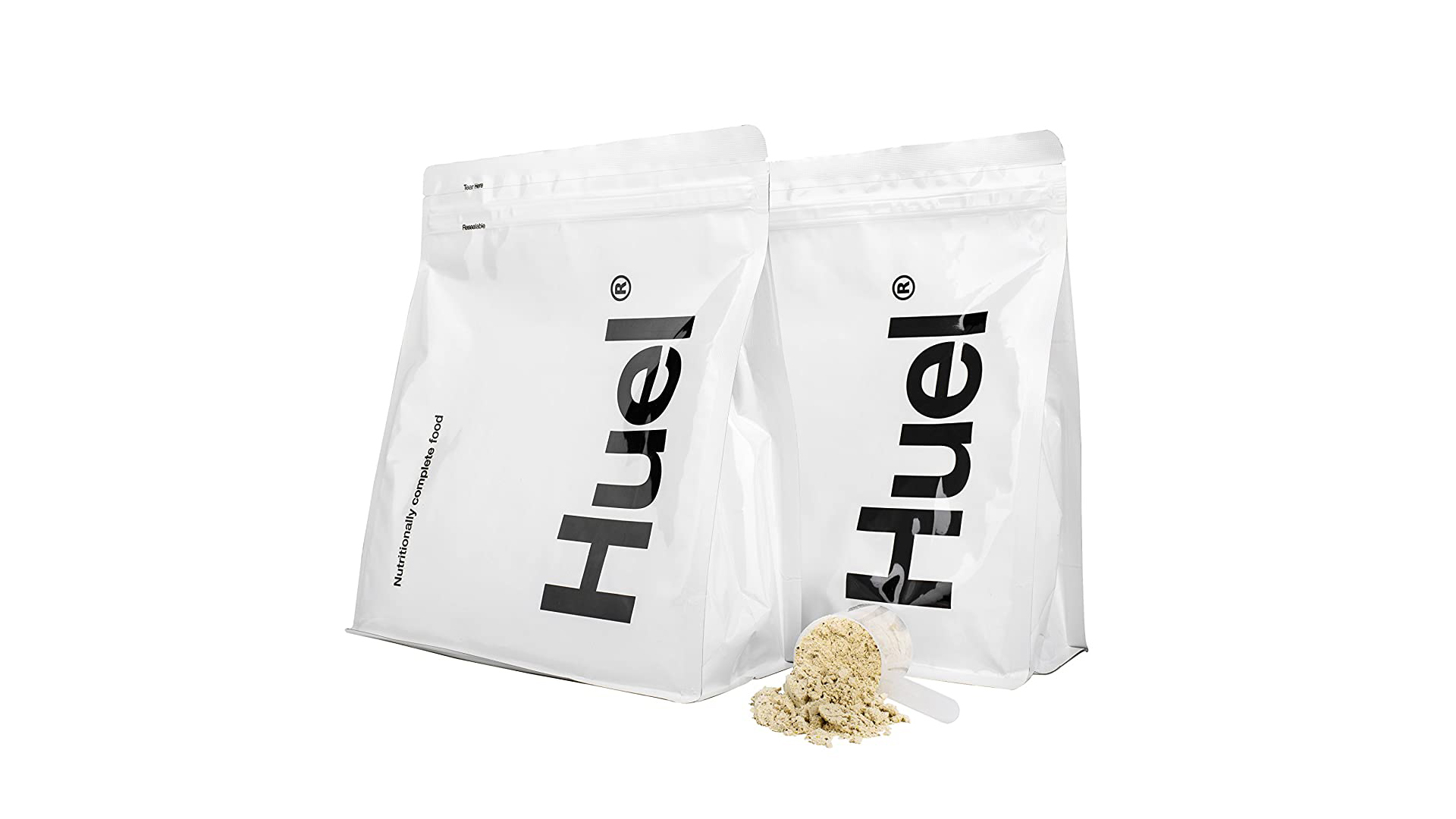
Huel Powder v3.0
Specifications
Reasons to buy
Reasons to avoid
Huel Powder v3.0 is a plant-based meal replacement shake that comes in 10 different flavors and provides a hefty dose of calories. A single serving contains nearly 30g of complete protein from a blend of pea, flaxseed and brown rice, as well as a whooping 45g of complex carbohydrates for slow energy release.
This powder enjoys a 4.3 out of 5 star rating on Amazon, with over 200 reviews. Customers like the value for money but aren't so keen on the flavor. "I like this product and have been using it to replace my typical lunch each weekday since I purchased. I believe I still have around a half month's supply left. The shake is filling and I do not feel hungry during the second half of my work day when consuming it," said one reviewer. "It's not the most appetizing shake and a bit difficult to gulp down, but I am becoming accustomed to it and would recommend this shake to anyone trying to improve their eating habits."
A portion of Huel Powder v3.0 also provides 27 different vitamins and minerals, probiotics, kombucha, medium chain triglycerides and nearly 8g of prebiotic fiber. It’s also very low in sugar, containing just 1g per single serving. Therefore it’s safe to assume that due to its rich nutritional value, this meal replacement shake may not be the best choice for people who intend to lose weight. However, it would potentially suit active individuals, athletes, and people with demanding lifestyles who want a substantial and filling meal in an easy liquid form.
The downsides? Huel Powder v3.0 lacks digestive enzymes and is sweetened with synthetic sweeteners. It’s also quite expensive, and you need to purchase at least two tubs of the product in a single order.
The best value meal replacement shake
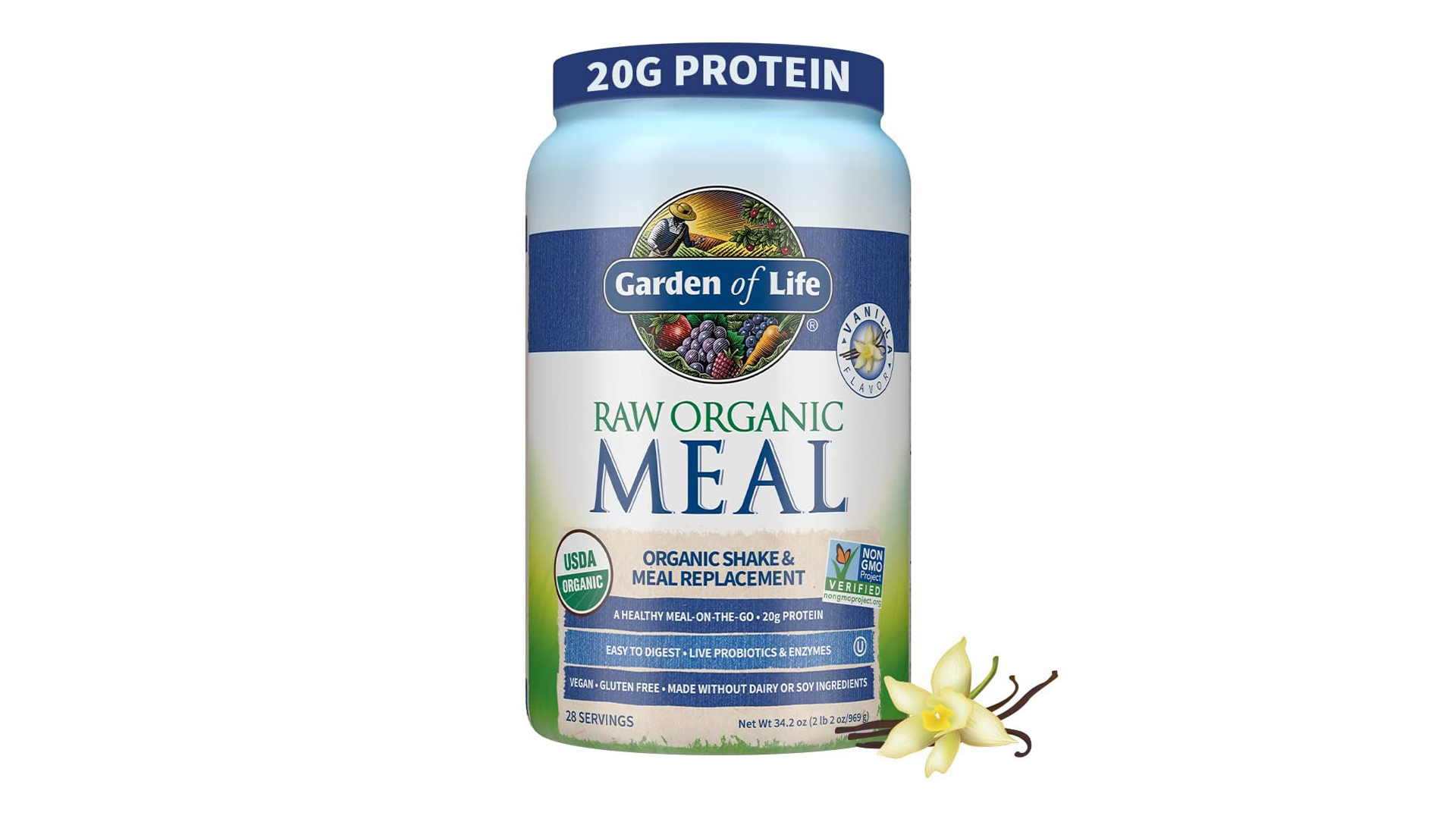
Garden of Life Raw Organic Meal
Specifications
Reasons to buy
Reasons to avoid
Garden of Life prides itself on using only real, clean ingredients that are mostly certified USDA Organic and non-GMO verified. It’s also a big proponent of healthy, clean eating – and this shows in its Raw Organic Meal range.
This shake scores a 4.2 out of 5 star rating on Amazon, with over 30,000 global reviews. People aren't a fan of the taste, but the more positive reviews recommend mixing with fruit and other ingredients to mask this. One reviewer said of the Chocolate flavor: "It tastes amazing with frozen bananas and peanut-butter and some almond milk. That's my husband's favorite recipe. I like to add cold coffee and almond milk for my morning pick-me-up. I also ordered the Vanilla Protein and it's very versatile."
It’s packed with nutritious ingredients and is free from gluten, soy, dairy products and tree nuts, as well as artificial colorings, flavorings or preservatives. One serving delivers nearly 20g of vegan protein that comes from a high quality blend of 13 different sprouted grains and seeds. At the same time, it provides only 130 calories and less than 1g of sugar, making it a great choice for people who want to watch their waistline.
Garden of Life Raw Organic Meal also contains a rich organic fruit and vegetable blend, as well as a substantial dose of probiotics and digestive enzymes. It’s the only product on our list that was made without heat processing in order to preserve the integrity of delicate proteins and more volatile components.
Nevertheless, there are few drawbacks. Although Raw Organic Meal provides nearly 21 different vitamins and minerals, it’s not a huge number compared with amounts found in some competitors' products. There’s also only 3g of dietary fiber in a single serving.
Best meal replacement shake for weight loss
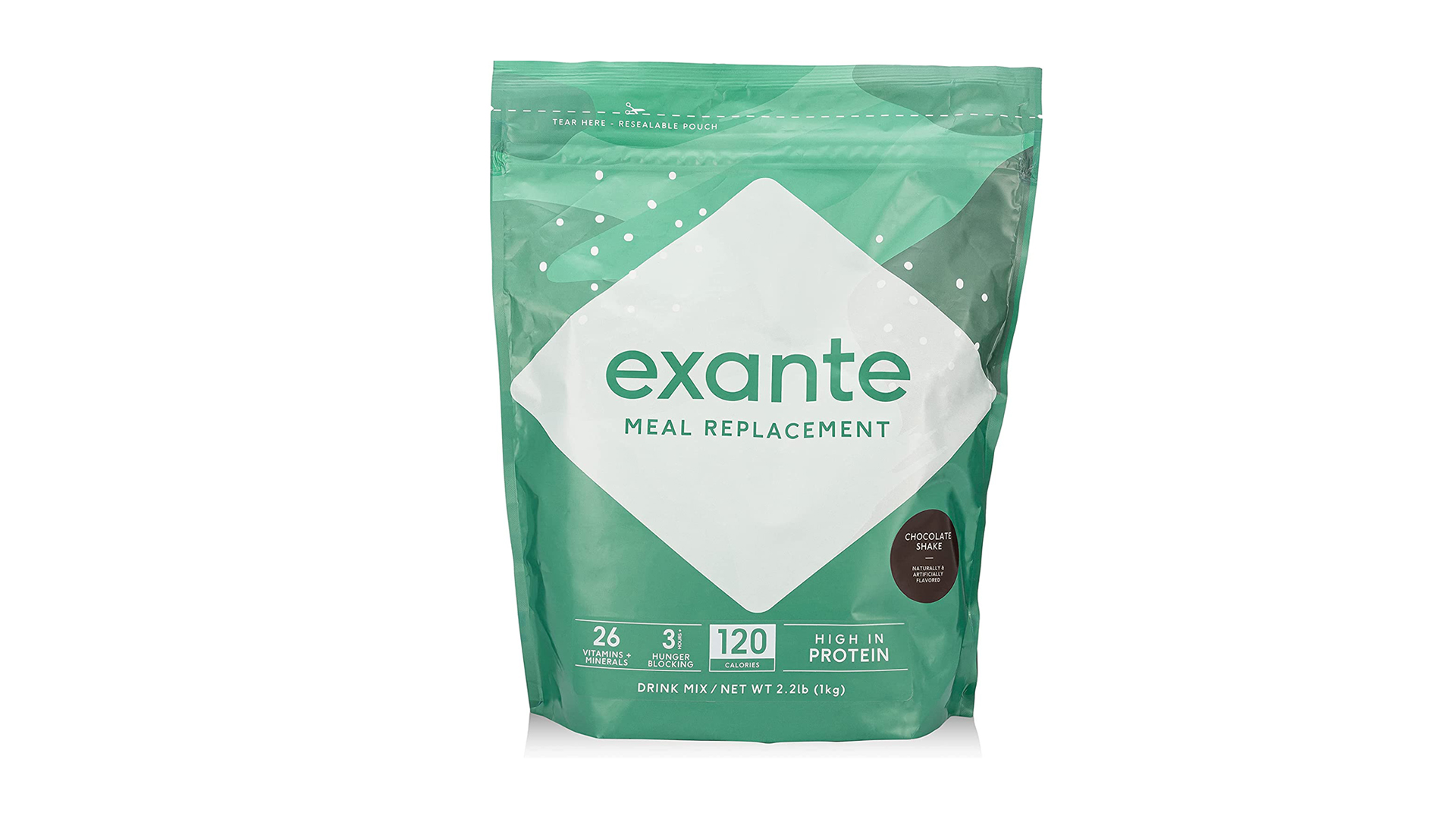
Exante
Specifications
Reasons to buy
Reasons to avoid
When it comes to meal replacement shakes, Exante is one of the most recognizable brands worldwide. Its Exante Meal Replacement Shake is endorsed by the National Health Service in the UK and is commonly prescribed to patients on diabetes and obesity prevention programmes.
Exante have a 3.9 out of 5 star rating on TrustPilot (but this does include customer service and website reviews rather than pure product reviews. Customers seem to enjoy the wide range of flavors: "Have used Exante for a few years now. I have a milkshake each day for lunch at work. I can load up my pack lunch bag at start of week with my glass, electric hand whisk, 5 milkshakes and a few snacks (roasted lava beans). That's me sorted. I love the range of flavors," said one reviewer.
Exante is designed to substitute one to two meals a day. It is very low in fats, carbohydrates and sugars, and provides only 120 calories in a single serving. One portion delivers nearly 5g of inulin, a type of fiber with strong prebiotic properties. It also contains a unique ingredient called Slendesta®, which according to the producer’s claims, can block hunger and reduce food cravings for at least three hours following ingestion. However, it’s worth noting that according to the EFSA Panel on Dietetic Products, Nutrition and Allergies, there is no established connection between ingesting Slendesta® and the reduction of body weight.
Still, Exante shakes are a great choice if you’re on a calorie-restricted diet. However, their meal replacements are not designed exclusively for weight loss purposes. Anyone can benefit from the great variety of flavors, a rich blend of digestive enzymes and nearly 26 different vitamins and minerals.
On the other hand, Exante is relatively low in protein, containing only 12g in a portion. This makes it potentially unsuitable for highly active individuals.
Packed with vitamins and minerals
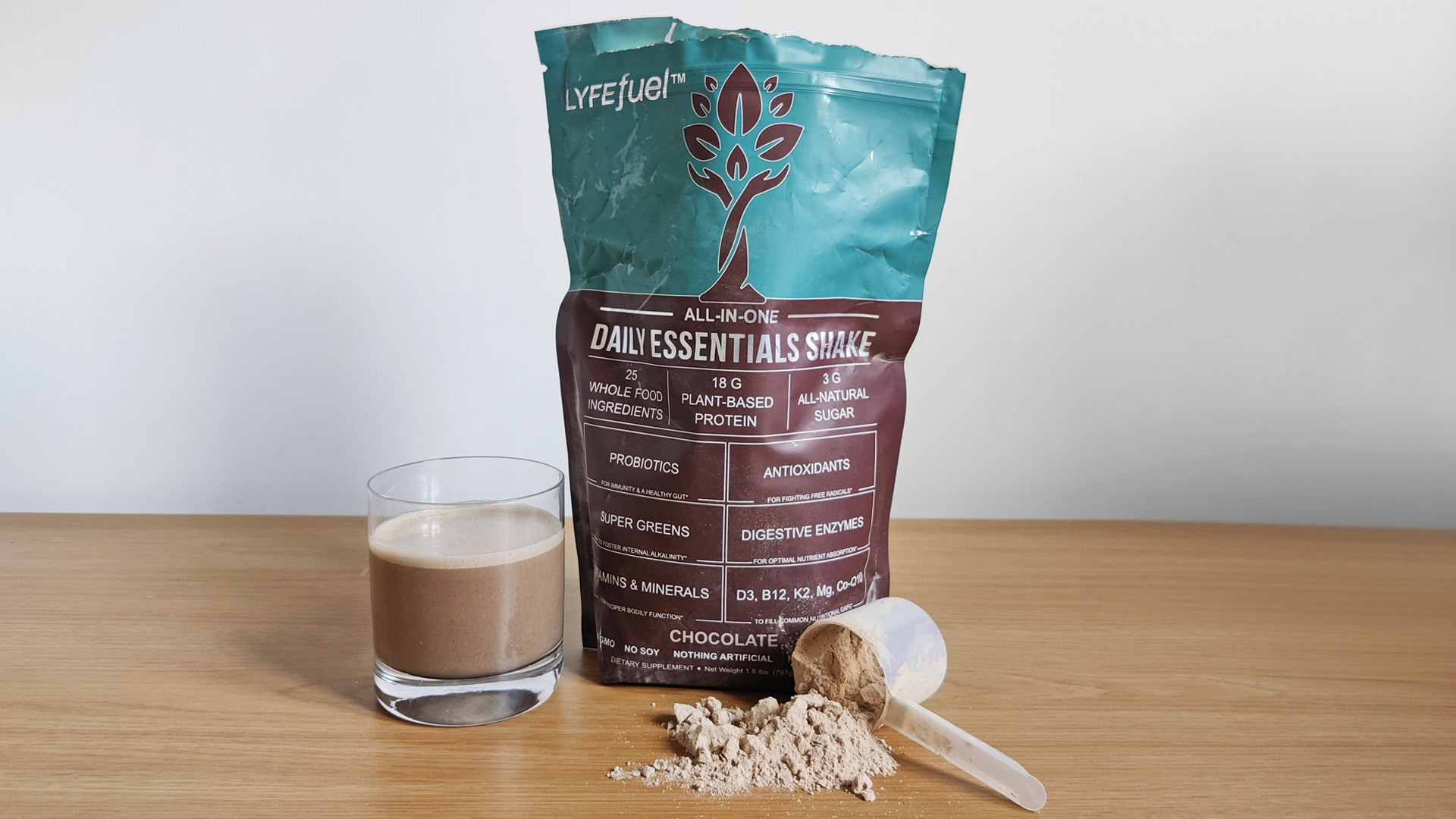
Lyfefuel All-In-One Essentials Shake
Specifications
Reasons to buy
Reasons to avoid
According to the company, Lyfefuel is “not your typical ‘meal replacement’”. That's because, instead of just focusing on calories, carbs, and protein, it provides a full spectrum of essential nutrients. In fact, one serving contains 27 different vitamins and minerals, including 500mcg of vitamin B12 (20,833% DV), 1,200 IU of vitamin D3 (150% DV) and 75mcg of iodine (50% DV). Overall, this is one of the most impressive, nutritionally complete meal replacement shakes we’ve tested. Not only this, it contains a probiotic blend (960 million CFU per serving) and five different digestive enzymes to facilitate absorption.
The Vanilla flavor gets a 4.2 out of 5 star rating on Amazon, with 60% of customers giving it the full 5 out of 5 stars. One customers said: "So far I have noticed more energy when drinking this. I have for breakfast each morning. I have been changing how I eat and adding weight lifting to my routine. So far, I really like the flavor and the great nutritional benefits of this. I have with Blue Diamond Almond Breeze unsweetened vanilla drink. Put in a shaker and voila! I would recommend this product. Give it a try if you are on a no sugar and low carb diet."
Lyfefuel also prides itself on quality. The All-In-One Essentials Shake is made in an FDA-registered facility and goes through third party testing for heavy metals, pesticides and microbials. The powder itself is gently dried and minimally processed to retain as many nutrients as possible, and it’s vegan-friendly.
We tried both the chocolate and vanilla flavors. Chocolate held its own mixed with plant-based milk, but it really excelled blended with ice and banana for a more substantial breakfast smoothie. An electric mixer also helped to eliminate any smaller lumps that a ball-whisk shaker couldn’t break through.
So what are the cons? First off, it contains just 110 calories per serving. Whilst this may be good news for those with weight loss goals, we thought it felt more like a snack or supplement than a ‘meal’. In fact, Lyfefuel does state that “you can experiment with more scoops and different liquid types and quantities that all impact the taste, texture, and total nutrients for the right balance that fills you up and suits your palate.” So if you’re using the shake as a meal replacement, rather than a snack, you might want to double up.
It’s also one of the more expensive meal replacement shakes we’ve tested — retailing at $70 for 24 servings. But considering it provides at least 50% of your daily value for a host of nutrients, it could be a good financial alternative to dietary supplements.
Best keto friendly meal replacement shake
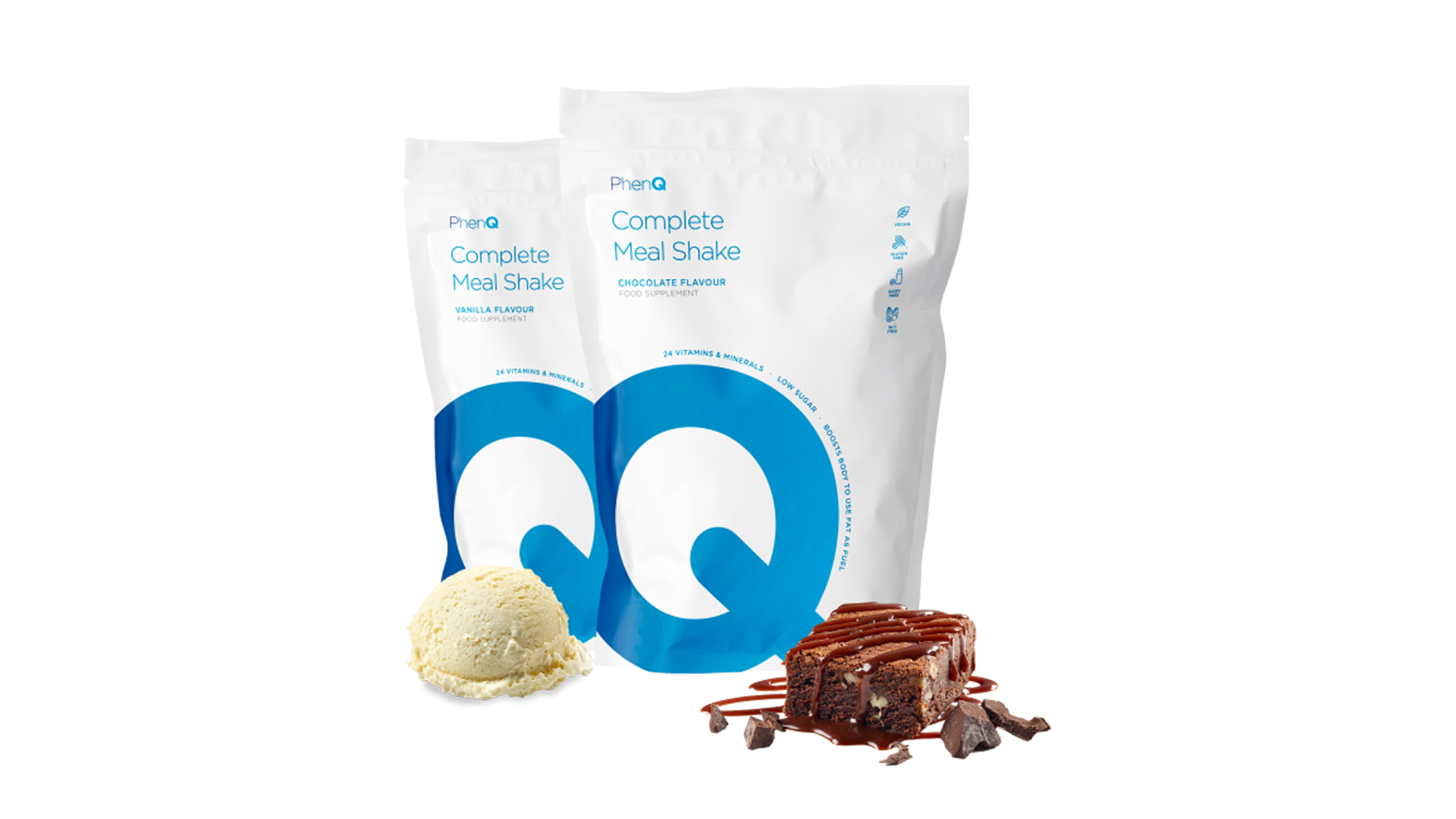
PhenQ
Specifications
Reasons to buy
Reasons to avoid
PhenQ’s meal replacement shake is specifically designed to help with shedding unwanted pounds. A single serving delivers 254 calories, 17g of fat and nearly 16g of whey protein, as well as only 5g of carbohydrates and less than 3g of sugar, making it a suitable choice for people following a low-carb diet.
PhenQ have very mixed reviews on TrustPilot, with some customers converted for life and some saying it doesn't work at all to support weight loss. Many complaints are about the website or delivery service, so aren't based on the actual quality of the shake. One 4 star review said: "I haven't been taking them very long but so far so good! I have endless energy and my appetite is definitely curbed and I'm happy with both of those results, however I can't speak to weight loss because I've just started them 2 weeks ago."
This meal replacement shake is also enriched with a substance called Innoslim®, a blend of Panax notoginseng and Astragalus membranaceus extracts. Both of these herbal additives have been marketed as weight loss aids. However, it’s worth mentioning that the evidence behind these claims remains inconclusive, as described in a review into dietary supplements published in the Nutrients journal.
PhenQ shakes also contain some medium chain triglycerides and two adaptogens (ashwagandha and Reishi mushroom extract), but their contents are slightly lower than the ones found in other brands. The price is definitely a selling point, as it’s one of the cheapest products in this guide.
Still, there are some disadvantages to PhenQ meal replacement shakes. It contains only 13 vitamins and minerals, placing it at the bottom of our list when it comes to micronutrient content. The product is also sweetened with synthetic sweeteners and doesn’t contain any probiotics or digestive enzymes.
The best premium meal replacement shake
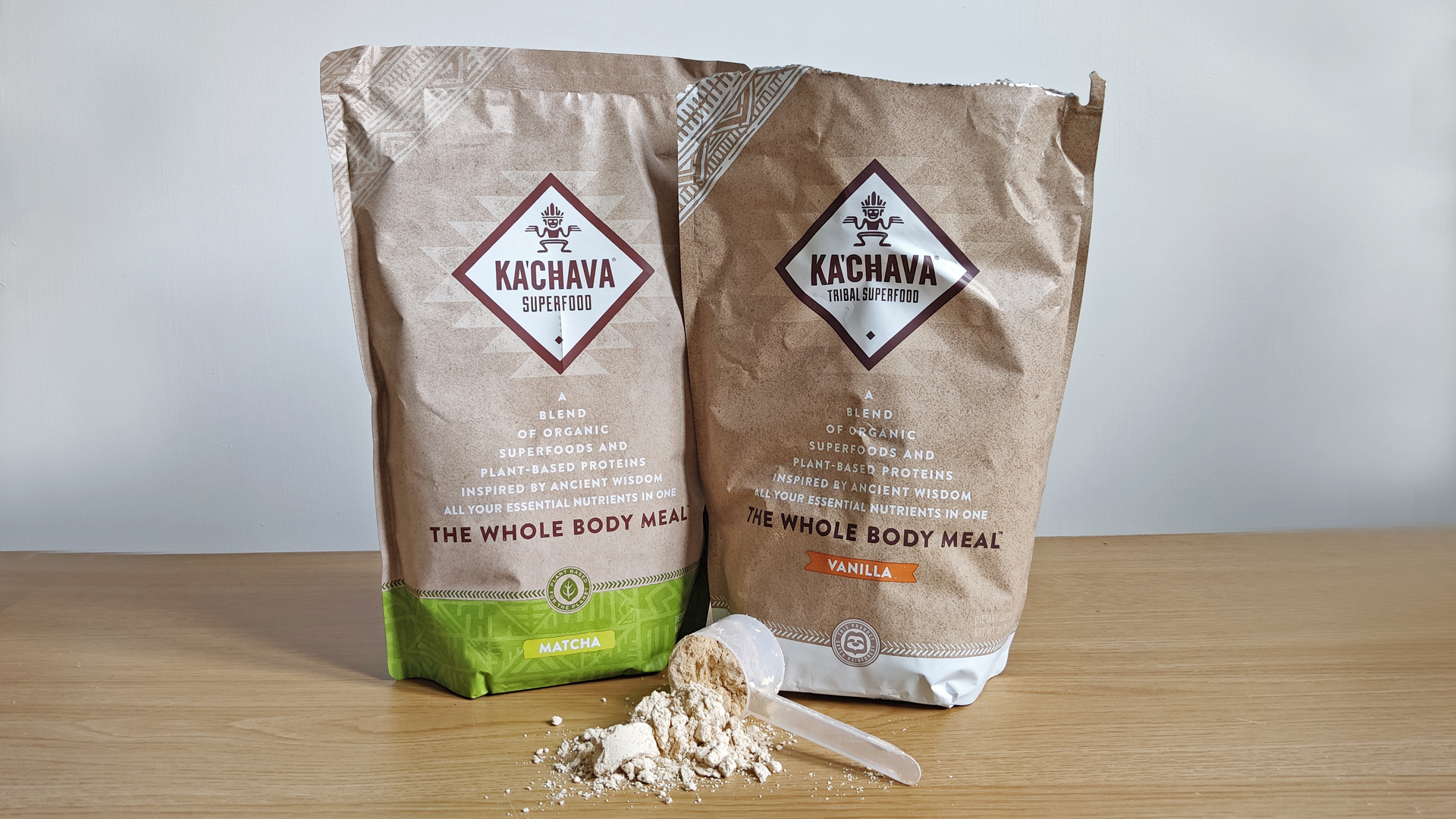
Ka'chava
Specifications
Reasons to buy
Reasons to avoid
If you like to support brands that actively champion environmental causes, you may want to check out Ka’chava. The brand is passionate about endangered species and protecting the rainforests – with every pack of their meal replacement shake, you can help to finance their projects.
This shake has a tidy 4.4 out of 5 stars on Amazon, with almost 5,500 ratings globally. "I decided to try this out since I've read a lot of good reviews. It gives me energy, and I do not feel tired. Overall, the taste is great but to me it is slightly sweet when I use 2 scoop. I reduced it to about 1.5 scoop and it was perfect. Like everyone is saying that it is expensive. I think it is worth it if it is healthy and good for you. I will continue to drink this and try out other flavors as well," said one customer.
Owing to the exceptional quality of the ingredients used to make these shakes, these products definitely belong in the premium category. A single serving of Ka’chava provides a whooping 25g of complete vegan protein and 6g of fiber, as well as only 6g of sugars. These meal replacements are packed with more than 70 different foods and nutrients too, including antioxidants, omega-3, medium chain triglycerides, probiotics and almost 26 different vitamins and minerals (with Daily Values being mostly above 40% per portion).
Ka’chava products are also free from artificial sweeteners, preservatives, flavorings and fillers. But what makes these shakes truly stand out is their high adaptogen content. According to a review recently published in the Nutrients journal, adaptogens are plant extracts that have the ability to enhance the body’s resistance to stress and physical endurance.
We took Ka'chava on a camping trip and found the chocolate flavor to be deliciously rich. Alongside a banana, one serving of the powder with water and a splash of milk kept us full until lunch too. The vanilla flavor is better made into a smoothie, and while we weren't personally a fan of matcha, some individuals might like this.
However, Ka’chava is a premium product and unfortunately, it comes with a big price tag.
Best high-protein, high-fiber meal replacement shake
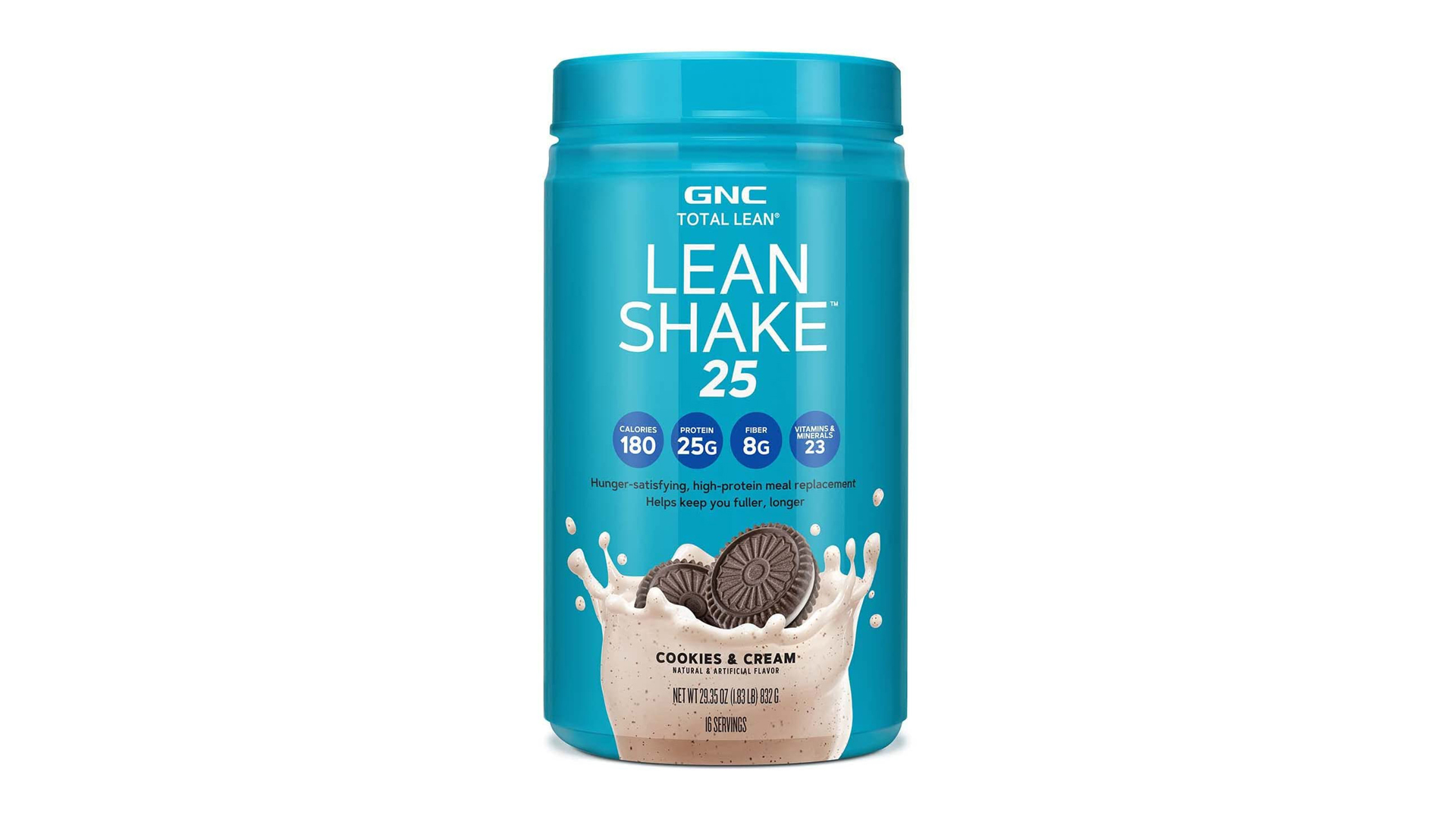
GNC Lean Shake 25
Specifications
Reasons to buy
Reasons to avoid
GNC is a versatile health and fitness brand. Its flagship meal replacement, Lean Shake 25, is an affordable product created for people whose primary goal is to lose weight. One serving contains 180 calories, 3g of fat and 3g of sugar, while delivering a whooping 25g of whey protein and 8g of dietary fiber. Lean Shake 25 comes in a range of flavor options, including unique gems like girl scout lemon and girl scout thin mints.
This shake has an average of 4.3 out of 5 stars on Amazon, with 68% of customers giving it the full 5 out of 5 stars. Some customers love the flavor, some hate it and some mention how filling it is while others say it does nothing to curb their cravings. "Tastes like chocolate, only downside is the time for stirring. The best tasting chocolate protein shake I’ve had, so it’s a 5* from me," said one 5 star review. "This product does taste amazing so that’s why the three stars but doesn’t do anything as far as the cravings. It is definitely not filling at all," said one 3 star review.
On the other hand, GNC shake delivers only 22 different vitamins and minerals, which is below what competitors tend to offer. Its micronutrient content is also on the low side – most vitamins and minerals cover only 20% of your Daily Value in a single portion. Having said this, the company says to drink two shakes daily in conjunction with a healthy weight management program, so you would still be getting micronutrients from solid food.
Overall, it’s a decent weight loss meal replacement shake, but you may need to invest in additional supplements to keep your health and fitness in peak condition throughout the course of using this product.
Best meal replacement shake, ethically speaking
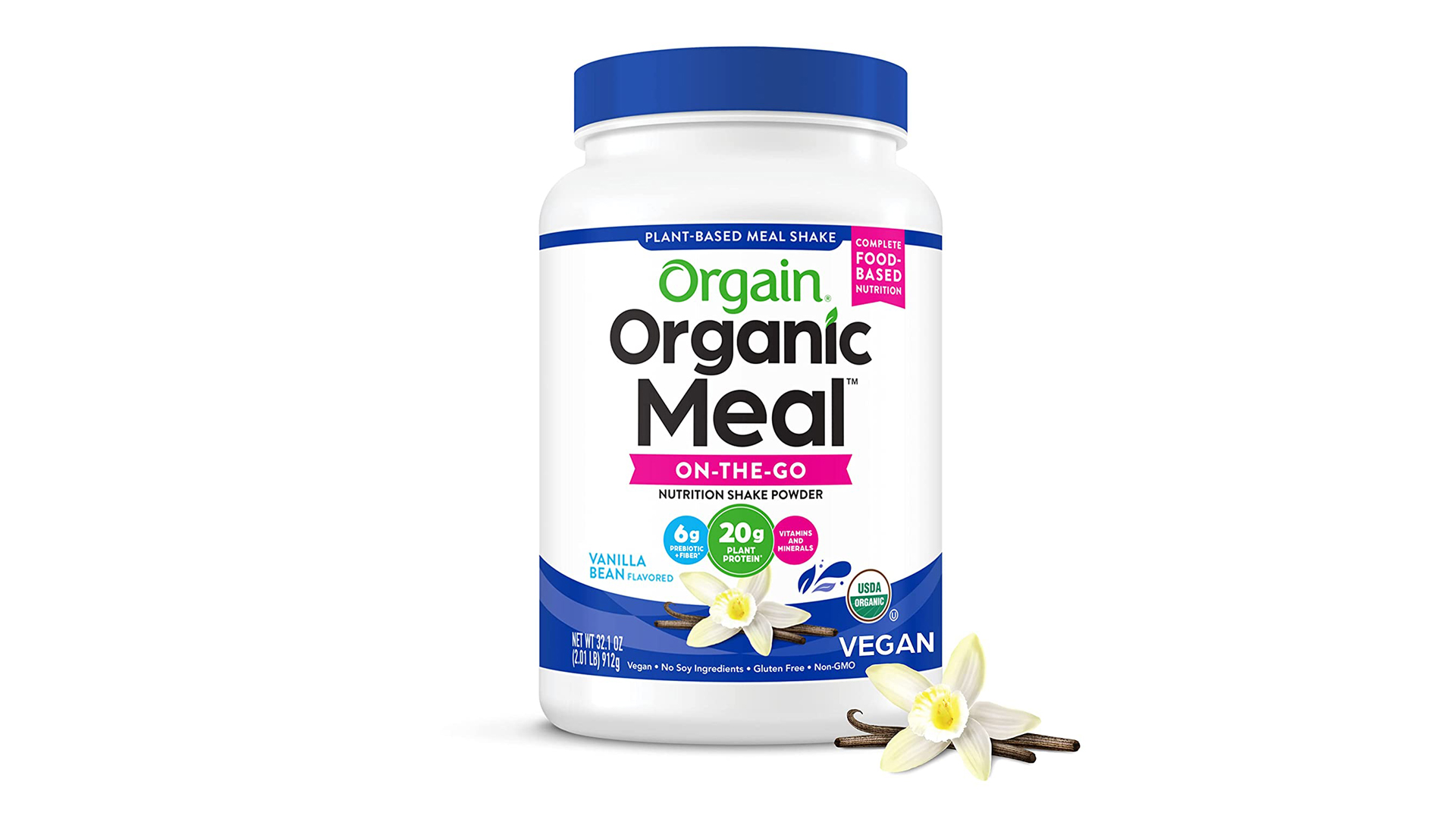
Orgain organic meal
Specifications
Reasons to buy
Reasons to avoid
Orgain says it believes in the power of organic food and clean eating, while actively championing initiatives aimed at reducing plastic pollution, making it one of the most environmentally-friendly brands in our guide.
Orgain does well on Amazon, with an average rating of 4.5 out of 5 stars and 73% of customers giving it a 5 out of 5. Most customers seem to find it very filling, but complain about the flavor. "I am on my first two weeks of having this only for breakfast. I have more energy, and feel way healthier since I started drinking this. Appetite is definitely doing better as days go forward. I mix mine with unsweetened almond milk 12-13oz. blend it with my ninja. Might eat a banana or apple before noon
Second meal of the day is a smoothie I make from plain yogurt, banana, apple cider vinegar, couple strawberries or frozen fruit," said one reviewer.
Its vegan Organic Meal nutrition powder is packed with clean, organic ingredients and provides nearly 20g of high quality pea, brown rice and chia seed protein blend in a single serving. Orgain doesn’t use artificial flavors or preservatives, and it makes sure its meal replacement shake is free from GMOs and gluten. Since it has a low fat and sugar content, Organic Meal may be a good choice for people who want to lose weight too.
On the other hand, one serving of the Organic Meal shake delivers only 2g of fiber and its micronutrient content is quite low in comparison with other brands. It lacks certain vitamins and minerals too, such as vitamin D and several trace elements. It’s also relatively expensive and comes in one container size.
Our experts

Glover started his career in nutrition at Holland & Barrett in 2018 and went on to pursue his studies in the field of clinical nutrition at the University of Aberdeen. He has completed research projects in areas such as the gut microbiome, vitamin D & immunity, as well as the effects of the maternal diet on chronic diseases in children. Glover has worked with numerous clients in weight management and preaches evidence based nutrition. In this guide, he gives his advice for when to use a meal replacement shake.

Aisling Pigott is a registered dietician and the founder of Dietitian Wales, a nutrition consultancy based in Wales, UK. She is also a Lead Paediatric Diabetes Dietitian at Cardiff and Vale University Health Board. Aisling was awarded a postgraduate degree in Advanced Dietetic Practice from Cardiff Metropolitan University and a certificate in Sports and Exercise Nutrition from Coventry University.

Charlotte Turner is a registered nutritionist and the founder of Health Nutritionist, a nutrition consultancy and nutrition clinic based in England. She holds a MSc degree in Human Nutrition from the London Metropolitan University and an MBA from the Edinburgh Business School. Charlotte specializes in weight management, nutrigenetics, gut health and treatment of eating disorders.
FAQs
What should you look for in a meal replacement shake?
With such a wide variety of products on the market, it may be challenging to choose the best meal replacement shake for your particular needs and circumstances. Food producers place multiple health and wellbeing claims on the front labels of their products, and though they can be used as a rough guide, it’s always best to thoroughly inspect the nutritional information on the back of the package.
Dr Brian Carson, lecturer in physiology at the University of Limerick and head of science and innovation at Whole Supp, agrees. “It’s really important to review the nutritional value of any meal replacement shake, ensure you keep an eye out for high sugar content, low protein or poor protein quality and any additives. After reviewing the market I would always keep an eye on what natural superfoods are in the formulation,” he says.
So what’s the ideal macronutrient ratio? To start with, the best meal replacement shakes will offer at least 15g of good quality protein per serving. There are many good types of animal-based protein, but the most common is a whey protein isolate, a type of complete protein derived from cow’s milk. If you’re allergic to dairy products or you’re following a vegan diet, there are many products with plant-based protein sources. The best plant-based meal replacement shakes will contain a combination of several different protein sources to ensure a complete amino acid profile.
Secondly, make sure to check how much sugar is in the product. According to the Center for Disease Control and Prevention, adults should keep their intake of added sugars to less than 10% of their total daily calories, which comes to around 25g-35g a day. Assuming that you eat three meals a day, a single serving of your meal replacement shake should contain less than 10g of this nutrient. Similarly, the USDA advises to consume at least 28g of dietary fiber a day. Most meal replacements tend to not include much of this nutrient, so if in doubt, go for a product that offers a higher fiber content.
Another important aspect is their micronutrient ratio. Vitamins and minerals are essential for maintaining good health and wellbeing. Variety is key – the more micronutrients, the better. If your meal replacement shake provides low amounts of your Daily Values for vitamins and minerals in a single serving, you’ll need to pack in a lot more nutrients in the meals you consume around this.
Avoid products that use corn syrup, hydrogenated oils and peculiar-sounding elements – you should be able to recognize most of the items on the ingredient list. The best meal replacement shakes also contain many functional ingredients that may ease your digestion and bring additional health benefits, such as probiotics, prebiotics and digestive enzymes.
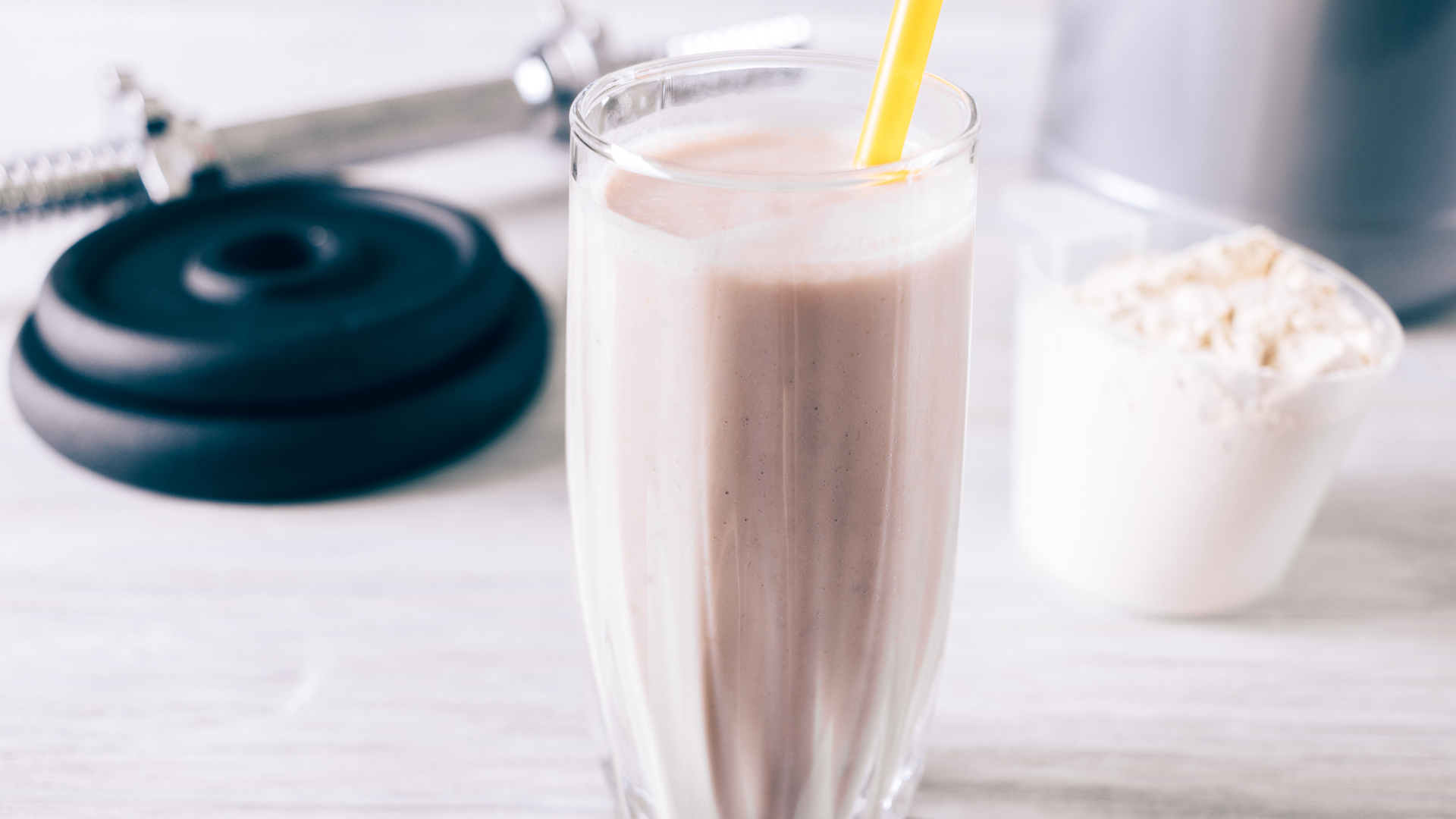
What are the benefits of using a meal replacement shake?
Convenience
Fast-paced, modern lifestyles place extreme demands on our schedules, often limiting our ability to cook from scratch and enjoy a meal in the comfort of our home. Although following a healthy, balanced diet is always the best way to get all your necessary nutrients, it’s not always feasible or convenient to do so. That’s where the meal replacement shakes step in.
Alex Glover, senior nutritionist at Holland & Barrett, told Live Science: “Meal replacements help to solve common diet-sabotaging dilemmas like giving in to a takeaway after a busy day. If you often turn to unhealthy food on the go because you haven’t made breakfast or prepared lunch, you may benefit from the convenience of nutritionally complete food.”
Meal replacement shakes are also more portable and compact than regular meals. If you spend entire days driving around or attending important meetings, you’ll find that carrying around a shaker bottle is far easier than hauling several food containers. What’s more, meal replacement shakes are a great option for when you don’t have any immediate access to kitchen appliances, for example, if you’re camping or hiking.
Complete nutrition
Our bodies need an extensive range of nutrients to maintain peak health and fitness. It’s relatively easy to develop deficiencies, particularly if you’re restricting your calorie intake to try and lose weight. Other times, you may need to cut down on certain foods or calorie values due to medical, financial or other important reasons. If you don’t want to pop numerous supplements, you need a carefully crafted meal plan that provides a sufficient amount of macronutrients, vitamins, minerals and various phytonutrients.
Weight loss aid
The best meal replacement shakes are often marketed as weight loss aids, and there are many good reasons why. They tend to be relatively low in calories, and maintaining a consistent calorie deficit is often necessary to see tangible weight loss results. However, many people struggle to stick to their calorie limit. For these people, meal replacement shakes can be a perfect solution.
What’s more, many products contain significant amounts of protein and dietary fiber, nutrients that play an important role in appetite regulation. Snacking can be a huge obstacle to a leaner, healthier body, whereas eating enough protein and fiber can help you reduce the intensity of food cravings and keep you fuller for longer.
Some brands even enrich their meal replacement shakes with ingredients that may have been shown to promote fat burning, such as green tea extract. But do they actually work? Indeed, there's growing evidence that meal replacement shakes can be great weight loss tools. According to a meta-analysis published in the International Journal of Obesity and Related Metabolic Disorders, overweight and obese adults on a low calorie diet may lose more weight if they use meal replacement shakes. Study subjects who did not use these products were reported to achieve less successful outcomes, at both the 3-month and 1-year evaluation time points.
Another study, which was published in the prestigious Appetite journal, investigated the effect of using meal replacements vs following a low-calorie diet on the incidence and intensity of food cravings. Based on the brain MRI food-cue reactivity and body composition measurements, meal replacements produced fewer cravings and promoted better weight loss outcomes than a regular diet.

When should you use a meal replacement shake?
The best meal replacement shakes can offer many benefits, but it’s worth remembering that using them may come with certain limitations and safety concerns.
Many people wonder whether it’s actually safe to ditch a regular diet and focus exclusively on meal replacement shakes instead. As enticing as it may sound, the answer is most likely ‘no’. Inevitably, all meal replacement shakes will lack or be short of certain nutrients or biologically active compounds.
“It is not recommended to live purely on meal replacement shakes as liquid diets can negatively affect our digestive systems and we miss out on some things like antioxidants and phytochemicals,” says Glover. That’s why most products will clearly state on the label that they’re not intended to entirely substitute a healthy diet, and instead, are designed to substitute one to two meals a day. The rest of the time, you should be eating solid meals, including a wide variety of food groups.
Some evidence also indicates that meal replacement shakes may not be suitable for older adults. According to a study published in the Hormone and Metabolic Research journal, liquid meal replacements may have a negative effect on appetite responses and insulin metabolism in the elderly. Similar findings were described in another study published in the Journal of the American Dietetic Association.
Are meal replacement shakes healthy?
Many meal replacement shakes are nutritionally complete, meaning they contain all the essential nutrients obtained from a balanced diet. However, these products should not be consumed in replacement of food long term, Charlotte Turner, a registered nutritionist and the founder of Health Nutritionist, a nutrition consultancy and nutrition clinic based in England, told Live Science. Meal replacement shakes are designed to satisfy basic dietary requirements of an average adult, i.e. provide a sufficient amount of vitamins, minerals and macronutrients, such as protein, fats and carbohydrates. However, no single product is able to mimic the exact nutritional value of a diet containing a wide variety of fruit, vegetables and wholegrains. “For example, meal replacement shakes may prevent you from getting enough plants and fiber that are beneficial to your gut microbiome and overall mental and physical health,” Turner said.
Replacing food with meal replacement shakes long term may also lead to an increased risk of gastrointestinal discomfort, Aisling Pigott, a registered dietician and the founder of Dietitian Wales, a nutrition consultancy based in Wales, told Live Science. “We know that meal replacement shakes often try to replicate a healthy balanced meal. However, when food is removed from its original structure, it behaves differently. This may be associated with digestive issues, such as bloating, constipation and stomach pain,” she said. In addition, meal replacement shakes may contain artificial sweeteners, bulking agents and other synthetic ingredients that may aggravate gastric symptoms in sensitive individuals.
Having said that, meal replacement shakes may provide some health benefits when used short term, or as a part of a healthy balanced diet. They are particularly effective at bridging nutritional gaps in individuals who struggle with having a solid meal, or those who follow highly restrictive diets. Meal replacement shakes may also help with managing obesity, because they help create an energy deficit and exert a better control over energy intake, Pigott said. In fact, studies have shown that overweight and obese participants who incorporate meal replacement shakes into their diet tend to lose more weight at one year follow-up than individuals who do not use these products, according to a 2019 systematic review published in the journal Obesity Reviews.
The evidence is growing that meal replacement shakes may also benefit metabolic health of overweight and obese individuals with type 2 diabetes, according to a 2019 meta-analysis published in the journal Diabetes Care. Researchers pulled together results from nine randomized controlled trials and found that using meal replacement shakes may help these individuals reduce their levels of blood pressure, fasting glucose and fasting insulin. However, more high-quality studies are needed to confirm these results, the meta-analysis authors noted.
Is a protein shake a meal replacement?
Meal replacement shakes often come in similar form and packaging as protein shakes, but they are not the same products. Protein shakes, as the name suggests, are formulated to be high in protein, and they often contain proprietary blends with amino acids and other muscle enhancing components. Meal replacement shakes, on the other hand, focus on providing a wide range of nutrients. “Protein shakes are marketed towards gym goers with a focus on rapid digestion to aid muscle recovery, whilst a meal replacement is mirroring a healthy, balanced meal and is likely to have additional fiber, vitamins and minerals,” Pigott said.
A protein shake can be used as a meal replacement in certain circumstances, but it depends on the specific goals and nutritional needs of the individual, Turner said. “A protein shake can provide a significant amount of protein, which is essential for muscle recovery and growth. However, it's important to ensure that the shake contains an adequate balance of other macronutrients, such as carbohydrates and fats, as well as micronutrients, such as vitamins and minerals, to make it a more complete meal replacement,” she said. Calorie content is another thing to consider. “A meal replacement shake should generally provide enough calories to sustain you until your next meal, and this can vary depending on individual needs and weight goals,” Turner said.
It is important to note that many protein shakes are formulated to support weight loss efforts, and they often come with reduced fat and carbohydrate content. Protein shakes that come with high calorie content are often branded as “mass gainers” and are designed to support weight gain and muscle building. Although they have a comparable energy content to meal replacement shakes, they often lack specific micronutrients, such as vitamins and minerals, and should not be consumed as a food replacement.
In summary, a protein shake can be used as a meal replacement, but it's crucial to ensure that it provides adequate nutrients, calories, and complements your overall dietary needs and goals. Consulting with a registered dietitian or healthcare professional can help you determine if using protein shakes as meal replacements is appropriate for your specific situation, Turner said.
How we test
How do we test meal replacement shakes at Live Science?
All of the meal replacement shakes in this guide have been tried and tested by the Live Science team. Firstly, we disregarded any products that had excessive levels of artificial sweeteners, additives or preservatives. We also looked at the texture of the powder, including how well it mixed into water, milk, and foods such as oatmeal or smoothie bowls. Finally, came the taste test, where we determined whether the taste was reflective of the flavor, unusually bitter or particularly sweet. Packaging was also noted, based on sustainability and convenience, as well as value for money.
This article is for informational purposes only and is not meant to offer medical advice.
Sign up for the Live Science daily newsletter now
Get the world’s most fascinating discoveries delivered straight to your inbox.

Anna Gora is a health writer at Live Science, having previously worked across Coach, Fit&Well, T3, TechRadar and Tom's Guide. She is a certified personal trainer, nutritionist and health coach with nearly 10 years of professional experience. Anna holds a Bachelor's degree in Nutrition from the Warsaw University of Life Sciences, a Master’s degree in Nutrition, Physical Activity & Public Health from the University of Bristol, as well as various health coaching certificates. She is passionate about empowering people to live a healthy lifestyle and promoting the benefits of a plant-based diet.










